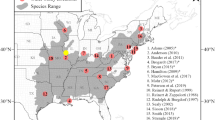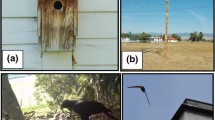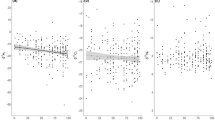Abstract
Food provisioning can change wildlife pathogen dynamics by altering host susceptibility via nutrition and/or through shifts in foraging behavior and space use. We used the American white ibis (Eudocimus albus), a wading bird increasingly observed in urban parks, as a model to study synergistic relationships between food provisioning and infection risk across an urban gradient in South Florida. We tested whether Salmonella prevalence was associated with changes in ibis diet (stable isotope analysis), space use (site fidelity via GPS tracking), and local density (flock size). We compared the relative importance of these mechanisms by ranking candidate models using logistic regression. We detected Salmonella in 27% of white ibises (n = 233) sampled at 15 sites. Ibises with diets higher in anthropogenic food exhibited higher site fidelity. Salmonella prevalence was higher at sites where ibises exhibited greater site fidelity and Salmonella was more prevalent in soil and water. Overlap in Salmonella serotypes between ibises and soil or water also was more likely at sites where ibises exhibited higher site fidelity. Our results suggest that repeated use of foraging areas may increase Salmonella exposure for birds if foraging areas are contaminated from animal feces, human waste, or other bacterial sources. Limiting wildlife feeding in parks—perhaps best achieved through understanding the motivations for feeding, education, and enforcement—may reduce health risks for wildlife and the public.




Similar content being viewed by others
Data Accessibility
All associated data on ibis Salmonella status, site fidelity, diet, and capture sites are available as supplementary material. The transmitter data are part of a larger study but are available upon request from the author.
References
Adams H, Murray MH, Welch C, Kidd Weaver A, Ellison T, Curry S, Hepinstall-Cymerman J, Hernandez SM. Capturing American white ibis in urban South Florida using two novel techniques. Journal of Field Ornithology (In Press)
Altizer S, Bartel R, Han BA (2011) Animal migration and infectious disease risk. Science (80- ) 331:296–302. https://doi.org/10.1126/science.1194694
Becker DJ, Streiker DG, Altizer S (2015) Linking anthropogenic resources to wildlife – pathogen dynamics: a review and meta-analysis. Ecol Lett 18:483–495. https://doi.org/10.1111/ele.12428
Becker DJ, Teitelbaum Claire S, Murray MH, Curry SE, Welch CN, Ellison T, Adams H, Rozier CRS, Lipp EK, Hernandez SM, Altizer S, Hall RJ (2018) Assessing the contributions of intraspecific and environmental sources of infection in urban wildlife: Salmonella enterica and white ibis as a case study. J R Soc Interface 15:20180654
Bildstein KL (1993) White ibis: wetland wanderer. Washington, D.C.: Smithsonian Institute Press
Binkley EE, Dorn NJ, Cook MI (2019) Feeding on the edge: foraging White Ibis target inter-habitat prey fluxes. J F Ornithol 90:235–247. https://doi.org/10.1111/jofo.12302
Bouwman KM, Hawley DM (2010) Sickness behaviour acting as an evolutionary trap? Male house finches preferentially feed near diseased conspecifics. Biol Lett 6:462–465. https://doi.org/10.1098/rsbl.2010.0020
CDC (2016) National enteric disease surveillance: Salmonella annual report, 2016. Atlanta, GA
Chard M, French K, Martin J, Major RE (2018) Rain drives foraging decisions of an urban exploiter. PLoS One 13:1–14. https://doi.org/10.1371/journal.pone.0194484
Creech TG, Cross PC, Scurlock BM, Maichak EJ, Rogerson JD, Henningsen JC, Creel S (2012) Effects of low-density feeding on elk-fetus contact rates on Wyoming feedgrounds. J Wildl Manage 76:877–886. https://doi.org/10.1002/jwmg.331
Cross PC, Edwards WH, Scurlock BM, Maichak EJ, Rogerson JD (2007) Effects of management and climate on elk brucellosis in the Greater Yellowstone Ecosystem. Ecol Appl 17:957–964
Curry SE (2017) Public motivations for resource provisioning and physiological impacts on White Ibis (Eudocimus albus) in urban South Florida. Doctoral dissertation, University of Georgia
Daoust P, Prescott J (2007) Salmonellosis. In: Thomas N, Hunter D, Atkinson CT (eds) Infectious diseases of wild birds Ames, IA: Blackwell Publishing, pp 270–288
DeNiro MJ, Epstein S (1981) Influence of diet on the distribution of nitrogen isotopes in animals. Geochemica Cosmochim Acta 45:341–351
Dorn NJ, Cook MI, Herring G, Boyle RA, Nelson J, Gawlik DE (2011) Aquatic prey switching and urban foraging by the White Ibis Eudocimus albus are determined by wetland hydrological conditions. Ibis (Lond 1859) 153:323–335
Epstein JH, Mckee J, Shaw P, Hicks V, Micalizzi G, Daszak P, Kilpatrick M, Kaufman G (2007) The Australian White Ibis (Threskiornis molucca) as a reservoir of zoonotic and livestock pathogens. Ecohealth 3:290–298. https://doi.org/10.1007/s10393-006-0064-2
Friend M, Franson JC (1999) Field Manual of Wildlife Diseases. General Field Procedures and Diseases of Birds. Information and Technology Report 01
Gopinath S, Carden S, Monack D (2012) Shedding light on Salmonella carriers. Trends Microbiol 20:320–327. https://doi.org/10.1016/j.tim.2012.04.004
Groepper SR, Gabig PJ, Vrtiska MP, Gilsdorf JM, Hygnstrom SE, Powell LA (2008) Population and spatial dynamics of resident Canada geese in southeastern Nebraska. Human-Wildlife Conflicts 2:270–276
Haley BJ, Cole DJ, Lipp EK (2009) Distribution, diversity, and seasonality of waterborne salmonellae in a rural watershed. Appl Environ Microbiol 75:1248–1255. https://doi.org/10.1128/AEM.01648-08
Heath JA, Frederick PC (2003) Trapping white ibises with rocket nets and mist nets in the Florida Everglades. J F Ornithol 74:187–192. https://doi.org/10.1648/0273-8570-74.2.187
Heath JA, Frederick PC, Edwards TM, Guillette LJ (2003) Reproductive physiology of free-living White Ibises (Eudocimus albus) in the Florida Everglades. Gen Comp Endocrinol 133:118–131. https://doi.org/10.1016/S0016-6480(03)00155-2
Hernandez SM, Welch CN, Peters VE, Lipp EK, Curry S, Yabsley MJ, Sanchez S, Presotto A, Gerner-Smidt P, Hise KB, Hammond E, Kistler WM, Madden M, Conway AL, Kwan T, Maurer JJ (2016) Urbanized White Ibises (Eudocimus albus) as carriers of Salmonella enterica of significance to public health and wildlife. PLoS One 11:1–22. https://doi.org/10.1371/journal.pone.0164402
Hobson KA, Clark RG (1993) Turnover of 13 C in cellular and plasma fractions of blood: Implications for nondestructive sampling in avian dietary studies. Auk 110:638–641
Hobson KA, Clark RG (1992) Assessing avian diets using stable isotopes II: factors influencing diet-tissue fractionation. Condor 94:189–197
Hoelzer K, Switt AIM, Wiedmann M (2011) Animal contact as a source of human non-typhoidal salmonellosis. Vet Res 42:1–28. https://doi.org/10.1186/1297-9716-42-34
Jahren AH, Kraft RA (2008) Carbon and nitrogen stable isotopes in fast food: signatures of corn and confinement. Proc Natl Acad Sci 105:17855–17860. https://doi.org/10.1073/pnas.0809870105
Jensen AN, Dalsgaard A, Nielsen EM, Baggesen DL, Stockmarr A (2006) Survival and transmission of Salmonella enterica serovar Typhimurium in an outdoor organic pig farming environment. Appl Environ Microbiol 72:1833–1842. https://doi.org/10.1128/AEM.72.3.1833
Jones JD, Kauffman MJ, Monteith KL, Scurlock BM, Albeke SE, Cross PC (2014) Supplemental feeding alters migration of a temperate ungulate. Ecol Appl 24:1–34. https://doi.org/10.1890/13-2092.1
Kelly DJ, Robertson A, Murphy D, Fitzsimons T, Costello E, Gormley E, Corner LAL, Marples NM (2012) Trophic enrichment factors for blood serum in the European badger (Meles meles). PLoS One 7:1–5. https://doi.org/10.1371/journal.pone.0053071
Kelly JF (2000) Stable isotopes of carbon and nitrogen in the study of avian and mammalian trophic ecology. Can J Zool 78:1–27. https://doi.org/10.1139/z99-165
Kidd AD (2018) Movement ecology of the American white ibis (Eudocimus albus) across an urbanization gradient. University of Georgia
Kistler WM, Stallknecht DE, Deliberto TJ, Swafford S, Pedersen K, Van Why K, Wolf PC, Hill JA, Bruning DL, Cumbee JC, Mickley RM, Betsill CW, Randall AR, Berghaus RD, Yabsley MJ (2012) Antibodies to avian influenza viruses in Canada geese (Branta canadensis): A potential surveillance tool? J Wildl Dis 48:1097–1101. https://doi.org/10.7589/2011-02-046
Knapp CR, Hines KN, Zachariah TT, Perez-heydrich C, Iverson JB, Sandra D, Halach SC, Lattin CR, Romero LM (2013) Physiological effects of tourism and associated food provisioning in an endangered iguana. Conserv Physiol 1:1–12. https://doi.org/10.1093/conphys/cot032.Introduction
Kushlan JA (1986) Responses of wading birds to seasonally fluctuating water levels: Strategies and their limits. Colon Waterbirds 9:155–162. https://doi.org/10.2307/1521208
Kushlan JA (1979) Feeding ecology and prey selection in the white ibis. Condor 81:376–389
Levantesi C, Bonadonna L, Briancesco R, Grohmann E, Toze S, Tandoi V (2012) Salmonella in surface and drinking water: Occurrence and water-mediated transmission. Food Res Int 45:587–602. https://doi.org/10.1016/j.foodres.2011.06.037
Loehle C (1995) Social barriers to pathogen transmission in wild animal populations. Ecology 76:326–335
Luo Z, Gu G, Giurcanu MC, Adams P, Vellidis G, van Bruggen AHC, Wright AC (2014) Development of a novel cross-streaking method for isolation, confirmation, and enumeration of Salmonella from irrigation ponds. J Microbiol Methods 101:86–92. https://doi.org/10.1016/j.mimet.2014.03.012
Maurer JJ, Martin G, Hernandez S, Cheng Y, Gerner-Smidt P, Hise KB, D’Angelo MT, Cole D, Sanchez S, Madden M, Valeika S, Presotto A, Lipp EK (2015) Diversity and persistence of Salmonella enterica strains in rural landscapes in the southeastern United States. PLoS One 10:1–19. https://doi.org/10.1371/journal.pone.0128937
Murray MH, Becker DJ, Hall RJ, Hernandez SM (2016) Wildlife health and supplemental feeding: A review and management recommendations. Biol Conserv 204:163–174. https://doi.org/10.1016/j.biocon.2016.10.034
Murray MH, Kidd AD, Curry SE, Hepinstall-Cymerman J, Yabsley MJ, Adams HC, Ellison T, Welch CN, Hernandez SM (2018) From wetland specialist to hand-fed generalist: Shifts in diet and condition with provisioning for a recently urbanized wading bird. Philos Trans R Soc B Biol Sci 373:20170100. https://doi.org/10.1098/rstb.2017.0100
Newsome TM, Dellinger JA, Pavey CR, Ripple WJ, Shores CR, Wirsing AJ, Dickman CR (2014) The ecological effects of providing resource subsidies to predators. Glob Ecol Biogeogr 24:1–11. https://doi.org/10.1111/geb.12236
Oro D, Genovart M, Tavecchia G, Fowler MS, Martínez-Abraín A (2013) Ecological and evolutionary implications of food subsidies from humans. Ecol Lett 16:1501–1514. https://doi.org/10.1111/ele.12187
Parker JM, Folk MJ, Baynes SB, Candelora KL (2008) Use of clap traps in capturing nonmigratory whooping cranes in Florida. Proc Tenth North Am Crane Work 10:141–146
Parnell AC, Inger R, Bearhop S, Jackson AL (2010) Source partitioning using stable isotopes: coping with too much variation. PLoS One 5:e9672. https://doi.org/10.1371/journal.pone.0009672
Phalen DN, Drew ML, Simpson B, Roset K, Dubose K, Mora M (2010) Salmonella enterica subsp. enterica in cattle egret (Bubulcus ibis) chicks from central Texas: Prevalence, serotypes, pathogenicity, and epizootic potential. J Wildl Dis 46:379–389. https://doi.org/10.7589/0090-3558-46.2.379
Plowright RK, Foley P, Field HE, Dobson AP, Foley JE, Eby P, Daszak P (2011) Urban habituation, ecological connectivity and epidemic dampening: the emergence of Hendra virus from flying foxes (Pteropus spp.). Proc R Soc B 278:3703–3712. https://doi.org/10.1098/rspb.2011.0522
Robb GN, McDonald RA, Chamberlain DE, Bearhop S (2008) Food for thought: Supplementary feeding as a driver of ecological change in avian populations. Front Ecol Environ 6:476–484. https://doi.org/10.1890/060152
RStudio Team (2016) RStudio: Integrated Development for R v.1.1.453
Sacchi R, Gentilli A, Razzetti E, Barbieri F (2002) Effects of building features on density and flock distribution of feral pigeons Columba livia var. domestica in an urban environment. Can J Zool 80:48–54. https://doi.org/10.1139/z01-202
Sargeant BL, Gaiser EE, Trexler JC (2010) Biotic and abiotic determinants of intermediate-consumer trophic diversity in the Florida everglades. Mar Freshw Res 61:11–22. https://doi.org/10.1071/MF08322
Schleimer A, Araujo G, Penketh L, Heath A, McCoy E, Labaja J, Lucey A, Ponzo A (2015) Learning from a provisioning site: code of conduct compliance and behaviour of whale sharks in Oslob, Cebu, Philippines. Peerj 3:e1452. https://doi.org/10.7717/peerj.1452
Schmidt N, Lipp EK, Rose JB, Luther ME (2001) ENSO influences on seasonal rainfall and river discharge in Florida. J Clim 14:615–628. https://doi.org/10.1175/1520-0442(2001)014%3c0615:EIOSRA%3e2.0.CO;2
Semeniuk CA, Rothley KD (2008) Costs of group-living for a normally solitary forager: Effects of provisioning tourism on southern stingrays Dasyatis americana. Mar Ecol Prog Ser 357:271–282. https://doi.org/10.3354/meps07299
Semeniuk CAD, Bourgeon S, Smith SL, Rothley KD (2009) Hematological differences between stingrays at tourist and non-visited sites suggest physiological costs of wildlife tourism. Biol Conserv 142:1818–1829. https://doi.org/10.1016/j.biocon.2009.03.022
Stephens DW, Krebs JR (1986) Foraging Theory. Princeton, NJ: Princeton University Press
Strandin T, Babayan SA, Forbes KM (2018) Reviewing the effects of food provisioning on wildlife immunity. Phil Trans R Soc B 373:20170088. https://doi.org/10.1098/RSTB.2017.0088
Taylor AK, Cao W, Vora KP, De La Cruz J, Shieh W-J, Zaki SR, Katz JM, Sambhara S, Gangappa S (2013) Protein energy malnutrition decreases immunity and increases susceptibility to influenza infection in mice. J Infect Dis 207:501–510. https://doi.org/10.1093/infdis/jis527
USFWS (2017) Wood stork (Mycteria americana). U.S. Fish and Wildlife Service North Florida Ecological Services Office. url: https://www.fws.gov/northflorida/woodstorks/wood-storks.htm. Accessed Oct. 15, 2017. In: U.S. Fish Wildl. Serv. North Florida Ecol. Serv. Off.
Welch CN (2016) Urban land use and movements of white ibises (Eudocimus albus) in South Florida. University of Georgia (MSc Thesis)
WHO (2018) Salmonella (non-typhoidal). In: World Heal. Organ. Fact Sheets. http://www.who.int/news-room/fact-sheets/detail/salmonella-(non-typhoidal). Accessed 1 Oct 2018
Acknowledgements
We thank our collaborators Sonia Altizer, Richard Hall, and Kristen Navara as well as volunteers and undergraduate researchers for their help with study design and data collection. We also thank the government biologists and managers who provided access to capture sites. All capture and handling procedures were reviewed and approved by the University of Georgia’s Institutional Animal Care and Use Committee (A2016 11-019-Y1-A0), a Florida Wildlife Conservation Commission permit (LSSC-11-00119F), and a USFWS permit (MB779238-0).
Funding
All work was supported by an NSF EEID Grant (DEB-1518611). Additional support was provided by the state and federal partners of the Southeastern Cooperative Wildlife Disease Study. [NB other than your manuscript title, none of the other information on this titlepage, above, should be included in your submitted manuscript (body) to ensure that when sent-for-review your manuscript is blinded].
Author information
Authors and Affiliations
Contributions
MHM carried out the data analysis and statistical analysis, participated in data collection, participated in the design of the study, and drafted the manuscript; SMH conceived of the study, designed the study, coordinated the study, and helped draft the manuscript; RSR performed laboratory work; AK participated in data analysis and data collection; JWC participated in study design; MJY participated in study design and helped draft the manuscript; HA, TE, and CW collected field data; EKL participated in study conception and design. All authors gave final approval for publication.
Corresponding author
Supplementary Information
Below is the link to the electronic supplementary material.
Rights and permissions
About this article
Cite this article
Murray, M.H., Hernandez, S.M., Rozier, R.S. et al. Site Fidelity is Associated with Food Provisioning and Salmonella in an Urban Wading Bird. EcoHealth 18, 345–358 (2021). https://doi.org/10.1007/s10393-021-01543-x
Received:
Revised:
Accepted:
Published:
Issue Date:
DOI: https://doi.org/10.1007/s10393-021-01543-x




